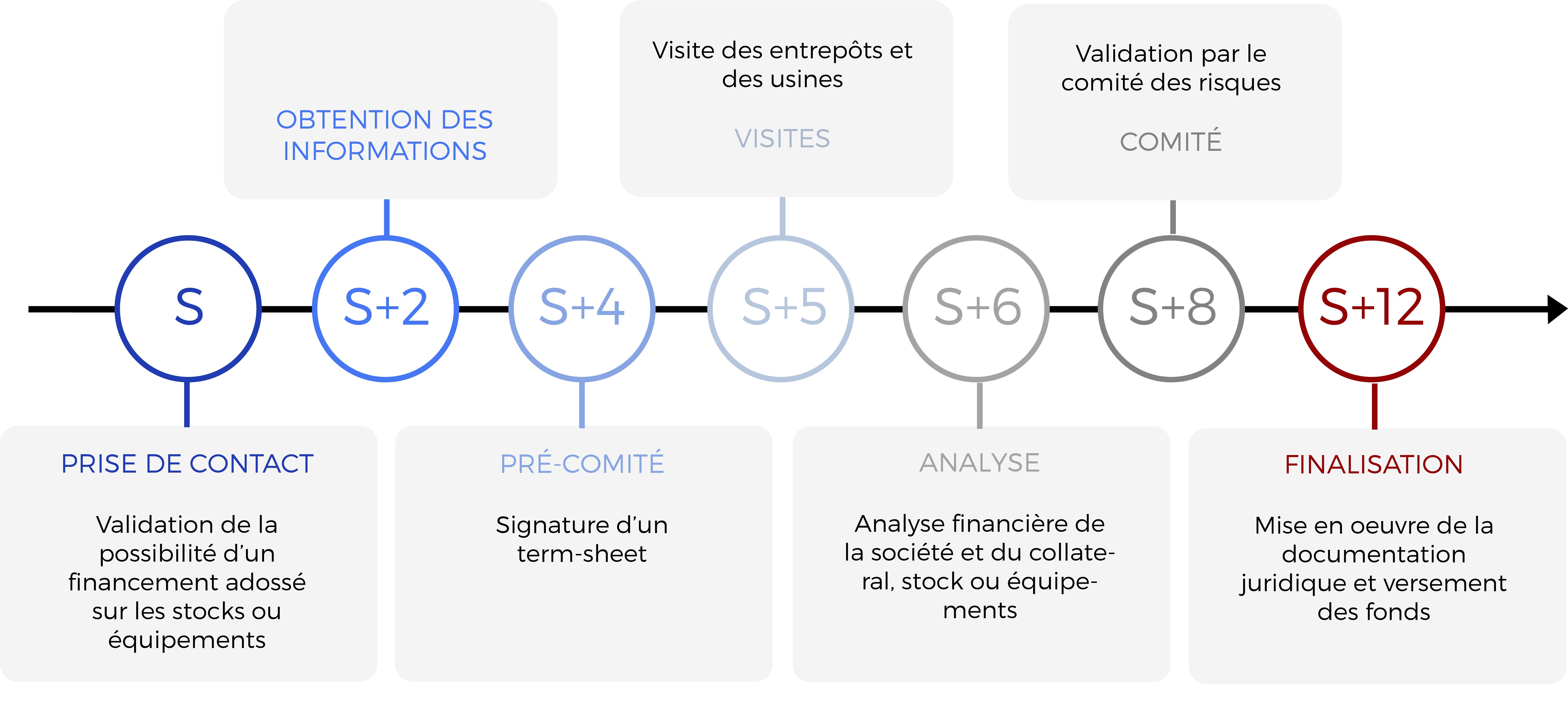FAQ
- Financing amounts between 3 and 15 million euros
- Financing matures in 3 to 7 years
- A minimum investment of 55% will be made in France, with a maximum of 45% outside France, in the European Union and Switzerland.
- Collateral essential to the company's activities At least 50% of loans will be secured by inventory, and no more than 50% by equipment.
A pledge with delivery is a contract that enables a company to use its inventory as collateral for financing. The solidity of the system makes it possible to provide companies with a significant amount of financing.
Here are the key points to bear in mind:
- The notion of dispossession does not imply transfer of ownership: the company retains ownership of the inventory, but transfers possession of the asset to the creditor until the debt is repaid. Dispossession takes the form of the intervention of a trusted third party called a third-party holder, whose main role is the practical implementation of the pledge.
- Inputs and outputs function normally. In return, a minimum stock level must be maintained. In the event of default, the creditor may exercise a right of retention.
- The company communicates a daily inventory to the third party holder, who will regularly check the physical presence of the stock.
Asset-owning SMEs and SMBs can leverage their inventories and/or industrial equipment.
Thanks to Gagéo's offer, companies can strengthen their medium- and long-term financial structure by using financing backed by their inventories and/or essential equipment.
To qualify, companies must have annual sales of at least €10 million, or €20 million for a group of companies, and inventories of over €6 million.
Depending on the case, their needs may arise from the following situations:
- growing companies at the limit of their banking facilities, wishing to strengthen their financial structure with medium- and long-term financing,
- companies wishing to diversify their sources of financing with long-term resources, without affecting their capital structure and without any dilutive effect,
- companies lacking adequate banking facilities and wishing to find financing to pursue their repositioning,
- companies under LBO wishing to refinance their mezzanine debt at a more attractive rate and alleviate restrictive covenants.
- companies looking to finance their operating cycle (WCR) and/or modernization/growth projects.
Stable, fully-owned inventories are a sustainable financing base for companies
Company inventories are pledged as collateral for financing. Depending on the case, the inventories pledged may be finished goods, raw materials or work-in-progress linked to long maturation cycles, such as wines and spirits.
They must be slow-maturing, not subject to retention-of-title clauses, and can be easily assessed & inspected during on-site visits.
Examples of eligible types of inventory include :
- raw materials used by companies in the industrial, agricultural and energy sectors,
- mechanical parts for the naval, automotive and aeronautical industries,
- wood, paper, packaging, furniture and manufacturing industry products,
- food products, wines and spirits,
- metal products and by-products,
- consumer durables,
- finished products from the shipbuilding, automotive, aeronautical,
- manufacturing and metallurgical industries.
Fonds Gagéo finances essential equipment for industrial operators.
Equipment eligible as collateral for Gagéo financing must have the following characteristics:
- be new or used industrial equipment or machine tools,
- be essential to the production process, activity and/or operation of the lessee,
- have a low obsolescence rate,
- be recoverable by third-party experts
- be capable of being remarketed.
Some examples of eligible types of equipment:
- fleets of industrial vehicles, lifting equipment or logging trucks,
- equipment leased to users, engines, handling equipment, etc.
- Industrial machine tools equipment for a paper production plant, such as press lines, die-cutting, packaging units, mold-making equipment, recycling lines, etc.
Afin d’instruire une demande de financement, chaque entreprise doit être en mesure de fournir un dossier d’information complet, portant à la fois sur ses performances financières passées et futures ainsi que ses actifs. Le tout permettant d’envisager une mise à disposition des fonds sous 12 semaines environ.

